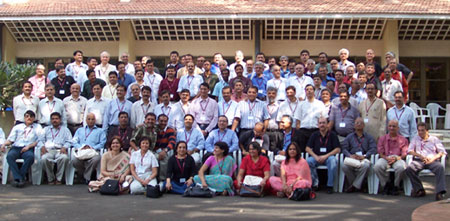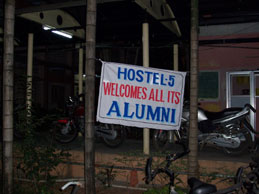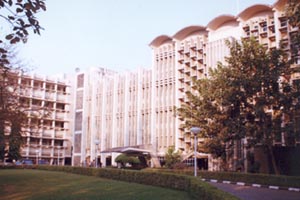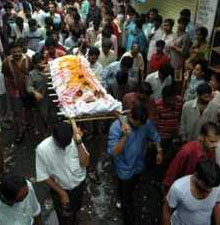
EFFECT OF UNLIMITED BROADBAND INTERNET ON CAMPUS LIFE AND CULTURE
AN OPEN LETTER TO DIRECTOR, IIT BOMBAY
Author - Anil Chawla

|
EFFECT OF UNLIMITED BROADBAND INTERNET ON CAMPUS LIFE AND CULTURE |
To,
The Director,
Indian Institute of Technology, Bombay
Powai, Mumbai - 400 076
Sir,
Thanks for the courtesies extended to all of us from the batch of 1980 at our Silver Jubilee Reunion in the last week of December 2005. We enjoyed the meet and were really glad to see that the institute has grown during the past two and a half decades.

While we were enjoying ourselves and renewing our long-lost contacts, some of us visited the hostels and interacted with the present students. We learnt that the culture on the campus has changed drastically from our days. The hostels are different from what we nostalgically remember.

There have been significant improvements in terms of infrastructure - better-equipped messes, water purification systems, washing machines and an Internet connection in each room. Our batch was the last one to use slide rule. Calculators were allowed when we were in second semester. When we came, hostel rooms did not even have ceiling fans (fans were fitted when we were more than half way through). When we passed out, personal computer was still many years away and all that we learnt of programming was using punch-cards. So, comparing today's infrastructure with our times is indeed mind-boggling.
We could have been envious of today's students. But, we saw a negative side of the picture that left us worried rather than envious. In our times, hostel lounge was a centre of activity. In those days, the lounge used to have a black & white TV, a music system, a carom table, a TT table, and a few magazines. It used to be bustling with activity, which was more often than not a bit too noisy for my liking. But, now when I visited lounge of my own hostel, it was a mere shadow of its glorious past. It still had the magazines, but everything else was gone. The furniture looked as if it had not been used for ages. The place looked dead and the silence was eerie.
The reasons for the change in ambience of lounge are not too far to seek. Every student now has a computer, which can be used for playing music - so coming to lounge and listening to music is passť. The computer has also replaced the TV. It appears that the computer has also replaced carom table and TT table. Now, students spend hours playing games on the computer in their respective rooms. We were told that counterstrike is the favourite on the campus, with some students playing it for hours at a stretch every day. I was even introduced to someone as the invincible champion of counterstrike. I tried to talk to this so-called champion. It was a futile exercise - he did not know how to talk. His language capabilities were limited to monosyllables and some shaking of the head as a zombie probably would.
Was he an isolated case? Probably yes, but more probably, no! Unfortunately, it seems that the counterstrike champion was just a representative of the new crop of IITians - good at the mouse but very bad at almost all human interaction skills - an impression confirmed by the student who made a presentation to our batch about TechFest. His presentation used computer-generated graphics in a way that we could never have done as students. Yet, he failed to impress. His skills as an orator are unlikely to bring any glory to IIT.
Public speaking is a skill that only a few have. Even, in our batch, not many were (or are) good orators. So, if the present generation of IIT students lacks this skill, this cannot be a cause of worry. There is, however, one difference. Two and a half decades ago, while the average student at IITB might have lacked oratory skills, the leaders among students - the ones who acted as spokespersons - were comparable to the best in the world. The student leaders of IITB during 70's and 80s represented the tip of a pyramid. Most of us were nowhere near the pinnacle, yet had our own strengths when it came to putting a point forward.
An average student of IITB during the late seventies honed his skills at discussions, argumentation and debate in the mess, corridors and steps of hostels. I remember that when I came as fresher, I could hardly speak English. In less than a year, I was speaking fluently - albeit, with a lot of slang. Compared to that today's situation seems strange. The messes are too quiet; lounges are empty; wing corridors do not have any hot debates going on. The most surprising part was when a student of Hostel 13 told me that he did not even know the names of all his wingmates and there was at least one person in his wing with whom he had not talked even once during the past four months or so that he had lived in the wing.
The shocking absence of social and interpersonal interaction in the hostels is not something that can be taken lightly. IIT has a brand value today because of its alumni. On IITB campus, there are many buildings that have been funded by alumni who have been successful in their lives. How many of these alumni were outstanding in academics while they were at IIT? How many gold medallists of IITB have done as well as Nandan Nilekani or Manohar Parrikar? IITians who have shone across the world did learn a lot in the classrooms of IITB, but my humble contention is that they learnt even more in the hostels interacting at close quarters with some of the best minds of the country.
It appears that Internet and internet-based games have replaced the warmth that hostels of IITB had till very recently. A computer in each hostel room with an unlimited broadband connection was a technological dream that was too farfetched for us to even imagine when we were students. Now that the dream has come true, it is time that we took care of the negative consequences.
I understand that managements of various IITs are aware of the problem. IIT Madras Director is rumoured to have said in one of his classes that he was less bothered about porn and more concerned about computer games that are addictive and can take up hours at a stretch. IIT Madras puts off its server from 0100 hours to 0400 hours so that students can sleep and do not continue playing through the night. I am told that IIT Bombay has introduced compulsory attendance (80 per cent) in all classes to ensure that students come to classes instead of playing games in their rooms.

Poor attendance in classes is just one of the consequences of extensive computer-game-playing. As Director, ensuring high level of academic performance is surely one of your primary duties. But, academic life is just one facet of IIT experience. IITB, in particular, and all IITs in general have prided themselves on all-round development of their students. With the adoption of new technological advances, it seems that a crisis situation has been created - students are missing out the complete transformational experience that IITs traditionally offered. Classroom instructions are one part of what the students are missing out when they remain glued to the screens, but that is not the only part or the most important part that they are missing.
To stress my point, let me discuss about the recent suicide on IITB campus. The poor soul apparently was distressed due to some decision of IITB management. He was a genius in one field and was studying in another. But, was all these sufficient reason for him to take the ultimate step? Did he talk to his friends before that? As it seems, he was a loner permanently glued to his computer screen. He was an island all unto himself. It seems that too many of students at IITB today are islands with no bridges connecting them to others even around them. This is not a problem of just IITB. Last semester, even IIT Kanpur had a suicide.

IITians are known today across the world as great warriors who fight against all odds without losing their sense of humour and wit. None of the attitudes and skills needed for this grit can be picked up from a computer screen or in a classroom. If the future generations of IITians come without essential survival and human interaction mindsets, they may make good nerds but they will no longer be able to make much of a mark in various fields where IITians are shining today. If this happens, IIT will no longer be the big brand that it is supposed to be today.
Management, faculty and above all student community of IIT Bombay must discuss the impact of the present policy of providing unlimited broadband Internet connection in every hostel room. I am not against adoption of new technology. Probably, we need more technology to ensure that Internet technology does not become a curse. Should the broadband connections in hostel rooms block all gaming? Should there be metering of usage in terms of time or downloaded bytes? These are some of the questions that come to my mind. Surely, there must be many more questions, alternatives, solutions that must be discussed threadbare by the IITB community.
I am sure that IITB community will be able to face up to the problem and come up with solutions that will guide all other institutes, colleges and universities not just in India but also abroad.
Thanks & Regards,
ANIL CHAWLA
13 January 2006
The above letter has attracted some very interesting comments.
Please read what others
have said and send me your comments.
 samarthbharatparty@gmail.com
samarthbharatparty@gmail.com

ANIL CHAWLA is an engineer (and now a lawyer too) by qualification but a philosopher by vocation and a management consultant by profession. He joined IIT Bombay in 1975 as a student for five-year B.Tech. (Mech. Eng.).

© All Rights Free